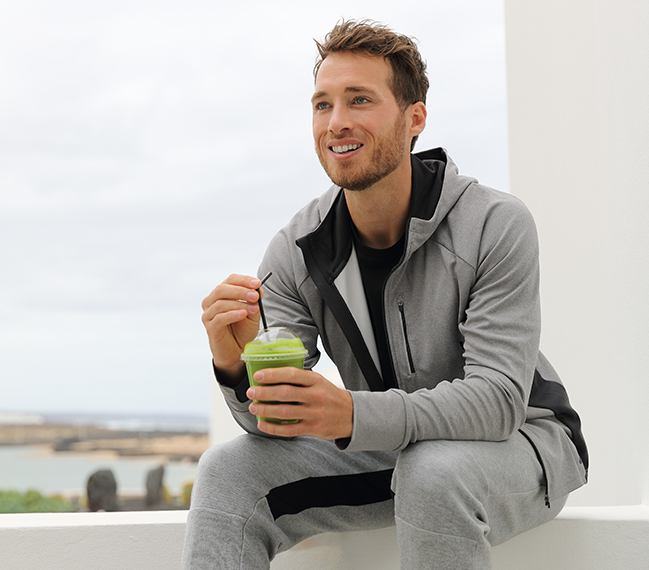
Home » Treatment Programs » Drug & Alcohol Detox
Drug & Alcohol Detox: Process, Side Effects, & Addiction Treatment
The first step to recovery
- Authored by Joe Gilmore
- Clinically Reviewed by Jenni Busse
- Last Updated 04/10/2024
- By Joe Gilmore
- Reviewed by Jenni Busse
- 04/10/2024

WHAT IS DRUG & ALCOHOL DETOX?
If you find yourself struggling with substance use disorder or alcohol use disorder, you might be avoiding treatment because you’re confused and apprehensive about detox.
Today’s guide outlines how you can detox your body from drugs or alcohol safely. The more you understand about this first crucial step on the road to recovery, the less likely it will stand in your way and prevent your recovery getting traction in the first place.
Detox is the abbreviated term for detoxification, a process of purging all toxins from your body, from alcohol and prescription painkillers through to illicit drugs.
Although every detox is slightly different, most detoxes will last from 5 to 10 days, depending on the severity of your drug addiction and the substance in question. Even if you are eager to launch into a treatment program, it’s vital to flush the toxins from your system before you get started with recovery properly.
By educating yourself about detoxification, you will make things easier and more comfortable during this challenging time.
If you’re still unconvinced, think of it this way: detox is the first time you’ll be clearly stating your intent to discontinue substance use. Consider detox as your first solid commitment to sustained recovery.
Alcohol & drug detox has 3 core objectives:
- Helping you to process toxins from your body as safely and comfortably as possible
- Managing withdrawal symptoms, using tapered medication as appropriate
- Creating a firm foundation for sustained recovery
Learn how you can kickstart your recovery as comfortably and safely as possible by engaging with a supervised medical detox program.

WHY IS DETOXING FROM DRUGS AND ALCOHOL IMPORTANT?
Getting the drugs or alcohol out of your system is the first step to recovery. Detoxing in a safe, professionally-staffed rehab center in Orange County is important because your brain may have become dependent on drugs or alcohol, which can affect its chemical makeup. In severe dependency cases, suddenly ending alcohol intake could lead to fatal seizures, and suddenly stopping the intake of benzos (benzodiazepine) could lead to delirium, a lost sense of self, and psychosis.
Detoxing from drugs addresses the physical issue of dependence and stabilizes you in preparation for ongoing treatment.
Detox is not a substitute for rehab, but rather a bridge into inpatient or outpatient treatment. By choosing to kickstart your recovery at a supervised medical detox center, you can make this phase of treatment less challenging, while at the same time strengthening your chance of initiating recovery without early relapse.
Abruptly discontinuing the use of alcohol, prescription medications, or illicit drugs at home and without medical supervision can be dangerous and possibly even life-threatening.
At Gratitude Lodge, our credentialed staff is trained and medically equipped to provide these on-site detox services at our drug detox center in Newport Beach. Our staff is also empathetic and can guide you through the emotional side of recovery. Detoxification can be the most difficult part of early recovery, which is why we offer personalized care, group therapy support, and an encouraging environment. Here, you are given the tools to succeed and benefit from a lasting recovery.

OUR DRUG AND ALCOHOL DETOX PROGRAMS
At Gratitude Lodge in Southern California, we offer supervised medical detox programs for alcohol, prescription medications, and all types of illicit drugs, including meth, cocaine, heroin, and fentanyl.
Take advantage of medications to streamline the intensity of drug or alcohol withdrawal. Additionally, you will benefit from continuous emotional and clinical care during the challenging initial phase of detoxification.
After a week or two of detox, you can transition directly into an inpatient or outpatient treatment program. While detox is a pivotal part of the recovery process, ongoing treatment will help you unpack the psychological aspect of addiction.
MEDICALLY SUPERVISED Alcohol & Drug DETOX PROGRAMS
Medical detox programs are specialized treatment facilities designed to assist individuals in safely overcoming physical dependence on alcohol or drugs.
These programs are staffed by medical professionals and provide a supervised, supportive environment to help patients manage withdrawal symptoms.
Medical detox typically involves the administration of medication to help ease discomfort and reduce the severity of withdrawal. This is not always the case, though. There are no medications available to ease meth or cocaine detox.
Beyond this, patients will receive support from therapists and other mental health professionals to address underlying psychological issues that may have contributed to substance abuse issues and addiction.
The goal of a medical detox program is to help individuals achieve a stable and comfortable state of sobriety, laying the foundation for long-term recovery and ongoing wellness.
YOUR SOBER TOMORROW STARTS TODAY
The admissions staff at our alcohol and drug detox centers are available 24/7 to answer your questions.
THE PROCESS OF DETOXING FROM DRUGS & ALCOHOL
EVALUATION
The time it takes to detox and the methods used depend on the length of drug abuse, methods of intake, and genetics. During evaluation, you can expect mental and physical screenings, providing family history, blood tests, and medication recommendations.
STABILIZATION
Because you may experience withdrawal symptoms, medical and mental therapies are provided. You may also receive addiction treatment drugs ranging from antidepressants to pills that suppress the desire for alcohol or drugs.
PREPARING FOR TREATMENT
The medical team will help decide if your treatment is best suited for inpatient facilities or outpatient facilities. Inpatient facilities offer structured environments free from distraction and temptation. Outpatient care offers therapy while you live at home and continue your career or family life.

DRUG DETOX SIDE EFFECTS
Detoxing from drugs and alcohol can have a number of side effects, which can range from mild to severe.
The severity and duration of these side effects will depend on many factors, including:
- Type of substance
- Duration of substance abuse
- Severity of substance abuse
- Physical health
- Mental health
Some common side effects of detoxing include:
- Headaches
- Fatigue
- Sweating
- Tremors
- Muscle aches
- Cramps
- Nausea
- Vomiting
- Diarrhea
- Irritability
- Anxiety
- Depression
In some cases, you may also experience more serious side effects like seizures, hallucinations, delirium tremens, and high blood pressure.
The side effects of detoxing can be uncomfortable and potentially dangerous, which is why it is always advisable to seek medical assistance when detoxing from drugs or alcohol. A medically supervised detox program can help manage and mitigate these side effects, ensuring a safe and comfortable detox process.
Additionally, the side effects of detoxing can also be a significant barrier to those seeking help for substance abuse. Many people may be deterred from seeking treatment due to the fear of experiencing uncomfortable side effects. Don’t be prevented from getting the help you need for fear of the side effects of detox. With the right medical detox program, these complications can be monitored and mitigated.
HOW LONG DOES DETOX TAKE?
The detoxification process depends on the severity of your addiction and how long you’ve been using drugs or alcohol. It can typically take anywhere from days or months to get past withdrawal symptoms. Withdrawal symptoms for alcohol can last up to a few weeks. Withdrawal from opiates can last up to 10 days, and prescription drug withdrawal can last months or years without treatment.
You may have heard of rapid detox or ultra-rapid detox, which requires anesthesia while medication replaces drugs in the body. Though this method is a fast way to remove drugs and avoid withdrawal symptoms, it can be a shock to the system and come with a lot of risks and a higher price tag. This method is usually considered for addictions to opiates and painkillers.
How Long Does a Drug Detox Take?
Detoxing from alcohol or drugs is a process that involves purging the body of toxins and toxic metabolites while managing any associated withdrawal symptoms.
There are two phases to drug and alcohol withdrawal:
- Acute withdrawal: Presentation of physical withdrawal symptoms that require medical management combined with cravings for drugs or alcohol.
- Post-acute withdrawal: Ongoing psychological symptoms that require continuous treatment and management.
The entire detox process for drugs or alcohol may last for a few days, or it may takes months or years, depending on factors that include:
- Substance of abuse
- Polysubstance abuse (abuse of more than one addictive substance)
- Prescription medications that may inflame or complicate withdrawal symptoms
- Duration of substance abuse
- Frequency and severity of substance use
- Route of administration (smoking, snorting, inhaling, ingesting)
- Physical dependence on drugs or alcohol
- Last use of addictive substance
- Co-occurring mental health conditions
- Medical history
- Age and gender
This guide outlines what to expect if you are going into detox, examines the duration of the alcohol and drug addiction detox process, and shows you how to transition from detox into substance abuse treatment.
ALCOHOL & Drug Detox Procedure
The sustained use of alcohol, prescription medications, or illicit drugs can bring about changes to the brain as it adjusts to the continuous presence of the substance. When physical dependence develops, you will require the substance to function normally.
Moderating or discontinuing the use of a substance upon which you are dependent will trigger uncomfortable withdrawal symptoms. Withdrawal symptoms are a physical and psychological response to the absence or declining blood concentration of the substance.
The detox process involves purging the substance and its metabolites from the system after discontinuing use. This natural process can be aggravating and challenging in a non-clinical setting. Alcohol and drug detox programs involve a set of interventions that include medications and therapies to effectively manage the withdrawal symptoms associated with detox.
A supervised medical detox aims to minimize physical harm that may stem from quitting an addictive substance after sustained use. The process involves three distinct components:
- Evaluation and assessment: Based on an initial assessment at the licensed medical detox center, a treatment team can recommend an appropriate detoxification level of care and develop a personalized treatment plan.
- Stabilization: The treatment plan is delivered with medications and therapies administered as required to streamline the detox process.
- Facilitating entry into ongoing substance abuse treatment: After detoxing from alcohol or drugs, you can move into ongoing substance abuse treatment in an inpatient or outpatient setting. Detox alone does not provide a sufficient strong foundation for sustained recovery without relapse.
Detox is not a substitute for rehab, but rather the first step in a chain of events that comprise recovery from drug or alcohol addiction. After you have detoxed safely, you can move into an inpatient or outpatient treatment program.
How do detox programs work, then?
How Do ALCOHOL & Drug MEDICAL Detox Programs Work?
The withdrawal symptoms that present during detox will vary depending on the substance of abuse. Some common side effects associated with drug and alcohol medical detox include:
- Dramatic mood swings
- Agitation
- Depression
- Anxiety
- Flu-like symptoms
- Nausea
- Vomiting
- Diarrhea
- Intense cravings
The process of drug or alcohol detox typically lasts for between 7 and 10 days.
A detox program provides around-the-clock care to ensure that you are as safe and comfortable as possible at all times.
Alcohol and opioid detox can be effectively managed with FDA-approved medications. Other medications can be beneficial during detox to treat symptoms of:
- Insomnia
- Depression
- Anxiety
- Panic
- Nausea
- Convulsions
- Seizure
How Long is Detox in Rehab?
Detox in rehab generally lasts for between 7 and 10 days, depending on many variables, including the scope and severity of the addiction.
- Alcohol detox: Alcohol withdrawal typically lasts for 3 to 4 days but can last up to 8 days.
- Opioid detox: Short-acting opioids like heroin and oxycodone involves a withdrawal process that lasts for 10 days. Detoxing from longer-acting opioids like methadone involves a more protracted onset of withdrawal, also lasting for 10 days.
- Benzodiazepine detox: Detoxing from benzos like Xanax or Valium make take 2 weeks or more. Post-acute benzo withdrawal symptoms may persist for months or years.
NIDA (National Institute on Drug Abuse) reports that detox alone does not typically produce lasting behavioral change. Detox when followed by evidence-based treatment, though, provides the strongest chance of recovery without relapse.
IS DETOXING COVERED BY INSURANCE?
We accept most PPO insurances at Gratitude Lodge, whether you’re staying with us for for 30 days or 45. We accept BlueCross BlueShield, Cigna, Aetna, and many more. As with any insurance, the cost depends on your insurance policy deductible and your policy co-pay. Inpatient and outpatient facility costs may vary.
Some insurance policies may limit your care providers or may want you to contribute to the cost. Most treatment facilities can help determine if your insurance is eligible. We’re happy to see if your insurance covers treatment for you or your loved ones. When you choose Gratitude Lodge, you’re choosing a fresh start.
Get Help Detoxing in a Safe Environment
If you need an alcohol or drug detox program, we can help you at Gratitude Lodge in Southern California. We have pet-friendly treatment centers located in Long Beach and Newport Beach offering addiction detox programs and ongoing treatment.
Access medications to reduce the intensity of cravings and withdrawal symptoms. Take advantage of emotional support and allow your treatment team to monitor your withdrawal and minimize complications. Following the medical detox process, you can shift directly into one of the following treatment programs:
- 30-day inpatient program
- IOP (intensive outpatient program)
- Dual diagnosis treatment program (for co-occurring disorders)
Engage with a personalized combination of science-backed treatments like medication-assisted treatment, counseling, group therapy, visualization, psychotherapy, and family therapy combined with holistic interventions.
You will leave Gratitude Lodge equipped with robust coping skills, a comprehensive relapse prevention plan, and access to ongoing treatment if required.
When you are ready to unchain yourself from drug or alcohol addiction, take advantage of alcohol drug detox and rehab at Gratitude Lodge. Call admissions at 800-994-2184 for immediate assistance.
WHAT TO EXPECT AFTER DETOX
While detox is the first physical step to recovery, there are mental steps involved in recovery after detox. Structured activities, group therapy, and individual counseling are built into your day when you stay at an inpatient residential addiction treatment facility such as Gratitude Lodge. After that, you’ll be able to transition to outpatient care, where you can stay in your own home, attend work or school, and attend therapy in the daytime or evening.
You’ll feel your withdrawal symptoms become manageable after detox with your medical therapy. Then, you can partake in group activities, learn from a set schedule, develop responsibility, and become self-sufficient again. Taking all of the steps from detoxification to outpatient rehabilitation is what helps establish the foundation of a lasting recovery and decreases the chance of relapse.
Our Partners
WE ACCEPT MOST PPO INSURANCE
Drug and alcohol rehab should be accessible to everyone. At Gratitude Lodge,
we work with most insurance plans to cover the costs of treatment.
DRUG AND ALCOHOL DETOX FAQS
A drug detox eliminates toxins from the system and addresses the issue of physical dependence, preparing you for ongoing addiction treatment.
A supervised medical detox will be the safest and most comfortable drug or alcohol withdrawal experience. Medications can minimize cravings and reduce the intensity of withdrawal symptoms, with clinical care reducing the chance of complications or relapse derailing your early recovery.
A supervised medical detox will be the safest and most comfortable drug or alcohol withdrawal experience. Medications can minimize cravings and reduce the intensity of withdrawal symptoms, with clinical care reducing the chance of complications or relapse derailing your early recovery.
While anyone can detox from alcohol, it is only medically necessary if you are physically dependent on alcohol. If you develop physical dependence on a substance like alcohol, you will experience unpleasant and uncomfortable withdrawal symptoms in its absence. Some people who drink alcohol very heavily may develop physical dependence after a few weeks of heavy drinkers, while it may take months or even years for some people to develop physical dependence. For those who are physically dependent on alcohol, a supervised medical detox program provides the safest pathway to ongoing treatment.
The amount of time it takes for the effects of alcohol to be removed from the body depends on factors that include the amount and frequency of alcohol consumption, your overall health, and your body weight. Typically, it takes the body an hour to process and eliminate one standard drink. That said, the effects of alcohol can linger in the body long after the alcohol has been processed. To reduce the risk of long-term health consequences, limit alcohol consumption and seek help if you are struggling with an alcohol addiction.
Naltrexone is an opioid antagonist used to treat alcoholism. The FDA-approved medication works by blocking the effects of opioids and reducing the urge to drink. It is typically used in combination with counseling and other behavioral interventions to help individuals overcome alcohol addiction. There are two other medications approved by the FDA for treating alcohol use disorder (alcoholism). Acamprosate can help to reduce the symptoms of alcohol withdrawal and to prevent relapse. Acamprosate works by restoring the balance of chemicals in the brain that are disrupted by chronic or heavy alcohol consumption. Disulfiram is also used to treat alcoholism by creating an unpleasant physical reaction to alcohol. This reaction can serve as a deterrent, helping to reduce your desire to drink and to reinforce your decision to stay sober.
Detoxification is the first step in the process of overcoming drug addiction and is a vital component of a comprehensive treatment program. Detox is a medically monitored process that helps you to withdraw from drugs as safely and comfortably as possible, beginning the journey towards recovery. The detox process may involve the use of medications to manage withdrawal symptoms like anxiety, depression, insomnia, and drug cravings. In some cases, you may also receive nutritional support and other forms of medical care to address any underpinning health issues that may have contributed to the development of drug addiction. In addition to medical care, the detox process may involve counseling and other behavioral therapies to help you to understand the underlying causes of your drug use and to develop the skills and strategies necessary to maintain sobriety. Drug detox is just the first step in the recovery process and ongoing treatment and support are crucial for sustained recovery.
Detoxing from drugs can be a tough process, but it is also an integral step towards recovery. When detoxing from drugs, you can expect to experience a range of physical and emotional symptoms as your body adjusts to the absence of the addictive substance, whether illicit drugs or prescription medications. Physical symptoms may include headaches, nausea, vomiting, tremors, sweating, and muscle aches. These symptoms can be managed with medications and other forms of clinical care. In some cases, may also experience more severe symptoms like seizures, which can be life-threatening in a non-clinical setting. Emotional symptoms can be equally challenging, and may include anxiety, depression, irritability, and intense cravings for drugs. These symptoms can be especially difficult to manage during a home detox, so instead seek support from a caring and compassionate team of healthcare professionals at an accredited drug rehab.





































